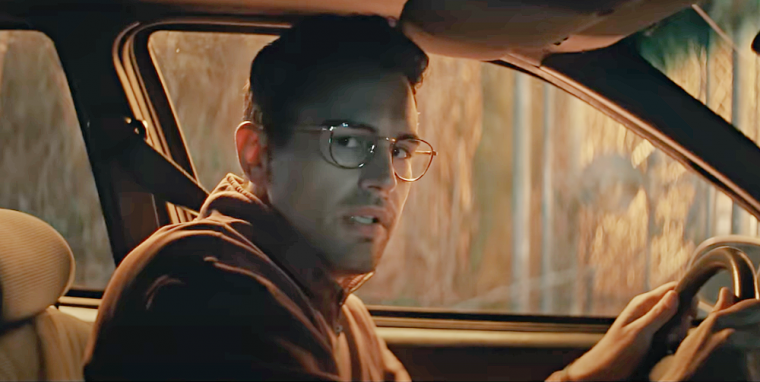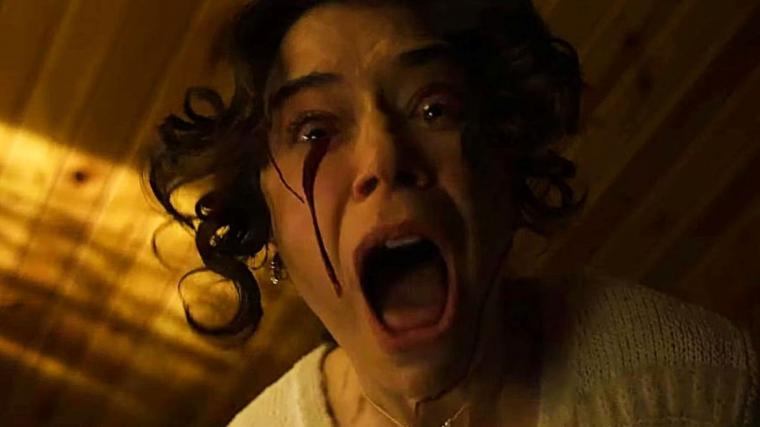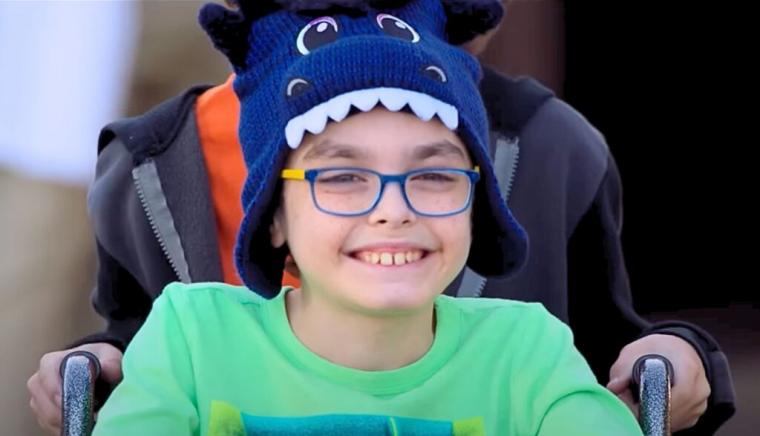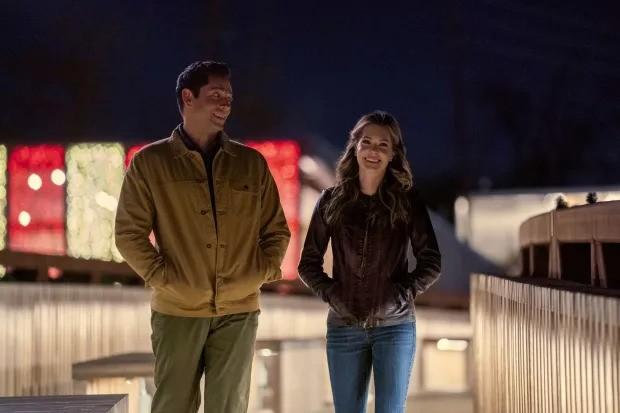
The Monkey
THE MONKEY
No one could possibly argue that we need more horror movies these days. But I'd suggest that we could always stand to have more in which characters, at the moment of their passing, go splat.
As on-screen demises go, explosive splat deaths are the best kind – they're lightning-fast and shocking and, generally speaking, obscenely funny. Writer/director Osgood Perkins' The Monkey, adapted from Stephen King's 1980 short story, is rife with these sorts of comic horrors, the killings coming from an unusually wide variety of sources: a shotgun blast; a bowling ball to the face; an electrified swimming pool; a stampede of wild horses. They strike, and blammo! Instant gory viscera. You'd think the effect would grow tiresome after a while, yet if anything, I wanted even more of these riotously disgusting set pieces. They're among the few elements of Perkins' latest to boast any vitality whatsoever.
Showing up for the first scene and never to return, Adam Scott plays an airline pilot who stops into a pawn shop with a toy he wants, needs, to get off his hands. It's a two-foot-tall version of one of those toy monkeys that incessantly clang cymbals when their key is turned. This thing, however, beats a drum, and when its key is turned, someone dies – and in particularly gruesome fashion. The pawn-shop clerk discovers this the hard way, and after they find the monkey hidden in a hat box at home, so do the pilot's pubescent, identical-twin sons Hal and Bill (both played by Christian Convery). Hal is a meek introvert and Bill is a brash bully; it's like if the Wil Wheaton and Kiefer Sutherland of Stand by Me played siblings. Yet after a series of hideous, obviously monkey-caused deaths, as well as their realization that the unholy plaything can't be destroyed, they at least find common ground in facilitating its removal, tossing it down a well and hoping it'll be gone from their lives forever. Twenty-five years later, the monkey comes back for more.

It takes maybe 30 minutes for Theo James to take over the roles of Hal and Bill, and even though I like him as an actor, The Monkey pretty much falls apart the moment he appears. The movie's first half-hour is actually quite decent. Because we're not yet acquainted with our demonic drummer's routine, there's an initial tingle to its homicidal prep: the raising of its drumstick, the slow display of its mirthless grin beneath lifeless eyes, the gradual acceleration of its drumbeat. Perkins times this preamble with giggly panache, the deaths are memorable (pity the babysitter who gets a trifle too close to a hibachi), and the central performances are terrific. Aided by some clever photography and makeup, Convery is wonderfully distinct as the temperamentally opposed twins, while Tatiana Maslany, as the boys' mom, is very funny when imparting valuable lessons on the inherent meaninglessness of life. In his too-brief role, I also loved Nicco Del Rio as a seriously ill-equipped priest whose funeral homily appears to have been written in crayon, if it was written at all.
Clearly, Perkins is also having fun with The Monkey as a deliberate exercise in clichéd Stephen King tropes, particularly in its Stand by Me echoes. (Rob Reiner's coming-of-age classic was, of course, adapted from King's novella The Body.) Even though the extended prelude is set in 1999, the film's score is front-loaded with bouncy pop and rock tunes from the '50s, and James narrates events from Hal's perspective like Richard Dreyfuss did for Reiner. Yet there are also evident nods to It and Carrie, and that unfortunate babysitter, for reasons passing understanding, is named Annie Wilkes – the same name given to the bedridden author's number-one fan in Misery. In the overall scheme of things, these references don't mean anything. They do, however, show that Perkins is working in a far more playful register than he was in last year's word-of-mouth hit Longlegs, and underline the fact that his new release is a comedy first and foremost.

If only it stayed one – or rather, if only it stayed an amusing one. But with the arrival of James' Hal, the inspiration and energy level immediately begin to wane. A 30-something dullard with a dead-end job and no friends, adult Hal also has a kid (Colin O'Brien's Petey) whom he sees only once a year for fear of the monkey's curse attaching itself to his child. Hitting the road for their annual vacation together, Hal is mopey and Petey is grumpy, and the downbeat dullness of their interactions isn't amended by the return of Bill, who comes across as every stereotypical grown-up bully in the Stephen King canon rolled into one. There's also a bizarre, wholly meaningless subplot for a local loser named Ricky, who wants the resurfaced monkey for ridiculous reasons – it looks like his absent dad! – and sports perhaps the most heinous meant-to-be-believable wig I've ever seen in a major motion picture. It looks like a cross between Michael Wincott's distracting mane in Talk Radio and Tommy Wiseau's actual hair in The Room, and it so wholly covers the top half of Ricky's face that I kept waiting to see if there was a badly disguised super-famous actor hidden underneath. (There wasn't, as the role is played by the largely non-famous Rohan Campbell.)
Even though Perkins' film runs a tidy 98 minutes, the experience, following the 1999 section, is anything but brisk. The director does come through with some gross, clever segments during the final hour, such as his montage of small-town Maine residents dying in unspeakable ways, and the finale is satisfyingly nihilistic, despite Perkins lobbing in one last cruel joke that allows audiences to leave on a laugh. I also admired the movie's refusal to explain the source of the monkey's invincibility; like death itself, this thing is simply there, and it ain't going away. Yet the occasional inventiveness isn't enough to override the lethargy, or the thematic pushiness of its absent-dads motif, or the dreary performances in its second and third acts. And by the time we got to the ultimate explanation for why so much bloodshed was coming to yet another sleepy burg in StephenKingland, the reveal was so ludicrously dopey that it took all my will not to greet it with a tortured “Come on.” For too much of its length, it's The Monkey, and not the monkey, that feels like death.

THE UNBREAKABLE BOY
Your tolerance for The Unbreakable Boy will no doubt depend on your tolerance for a bunch of other things, including, but not limited to: Zachary Levi; sanctimony in the guise of common sense; chatterbox tykes whose precocious nattering is meant to be endearing; and adult characters who have imaginary friends. Not imaginary like the playmates in IF. Imaginary in the form of a chubby, bearded, beer-swilling bestie in flannel who acts as the lead's Jiminy Cricket and “hilariously” passes out, while wearing imaginary scrubs, when witnessing his pal's wife give birth. I have a pretty low threshold for all of the above. Yet there's a really solid movie about addiction, responsibility, and parental stress buried somewhere beneath the schmaltz of writer/director Jon Gunn's pro-faith comic melodrama. You just have to dig awfully deep to find it.
The titular boy is 13-year-old Austin LaRette (Jacob Laval), who was born with both brittle-bone disease and a form of autism that manifests itself in nearly ceaseless good humor and constant one-sided conversation. That means he can easily break his leg in a routine fall, and will then talk your ear off on the way to the ER. I should mention up-front that Laval is terrific. He was one of the superbly directed children in Netflix's comedy special John Mulaney & the Sack Lunch Bunch – Laval played the kid who admitted to visiting the bathroom during a movie five times, “four productive” – and he wholeheartedly sells Austin's loquaciousness, optimism, and enthusiasm. He also does an amazing job of replicating, in full, Jack Nicholson's “You can't handle the truth!” monologue from A Few Good Men. What Laval can't do, what no one could do, is sell Gunn's notion that this frequently insufferable munchkin resolutely changes, for the better, the lives of everyone surrounding him. Austin isn't just a friendly, challenged youth here; he's employed as an unquestionable Force for Good in the Universe. So it's actually something of a relief to discover that The Unbreakable Boy is less interested in Austin than it is in his dad.

That would be Levi's Scott LeRette, a professional grind who turns to the bottle, which is often, every time he feels he's emotionally or financially failing his wife Teresa (Meghann Fahy) and their sons Austin and Logan (Gavin Warren), the latter of whom shares neither of his older brother's maladies. Gunn's film was originally set to be released three years ago, when Levi was deep in his Shazam! period, and his performance isn't without the actor's customary eye-popping and trying-too-hard brand of sincerity. (Whenever Scott wept, my own tear ducts instantly dried up.) Yet he's relatively inoffensive, and there's playable material here. The movie is based on the actual Scott LaRette's 2014 memoir, and you can sense the tougher, more discomforting work this one could've been without quite so many cutesy-poo contrivances, among them the comic hysteria of Scott's mother (an overacting Patricia Heaton) and Logan's ability to make nice with the school bully. There's also that damned imaginary friend Joe to contend with, and every time Drew Powell showed up in the role, I wanted to throw a blanket over my head and pretend the screening was imaginary. It bothered me that his presence in scene after scene after scene was suggestive of a psychosis that was never once acknowledged. It really bothered me that nothing Powell's Joe said or did was in any way entertaining.
Yet like last year's Ordinary Angels, which Gunn also directed, this inspirational drama is easy to sit through, primarily because Meghann Fahy is so unwaveringly excellent. Her Teresa also suffering from brittle-bone disease, Fahy layers her character's already trying circumstances with unmistakable notes of guilt, knowing that she unwittingly passed Austin's frailty onto her son. She's even better, though, when confronting Scott about his alcoholism and self-pity, and singlehandedly scrapes off much of the film's feel-goodery through the directness of her gaze and the force of her words. I didn't believe in much of The Unbreakable Boy. But I sure as hell believed in Fahy, and when I cried at the film – and yes, admittedly, I did – it was only when the drama was most affecting Teresa, the actor's emotions bleeding through her surface composure and into your soul. If you stick through the end credits, you'll discover that Fahy also sings! (She spent months in the Broadway run of Next to Normal.) Bones get routinely shattered in Gunn's movie, but after 109 minutes in its female lead's company, I'm the one who left with a serious crush.










